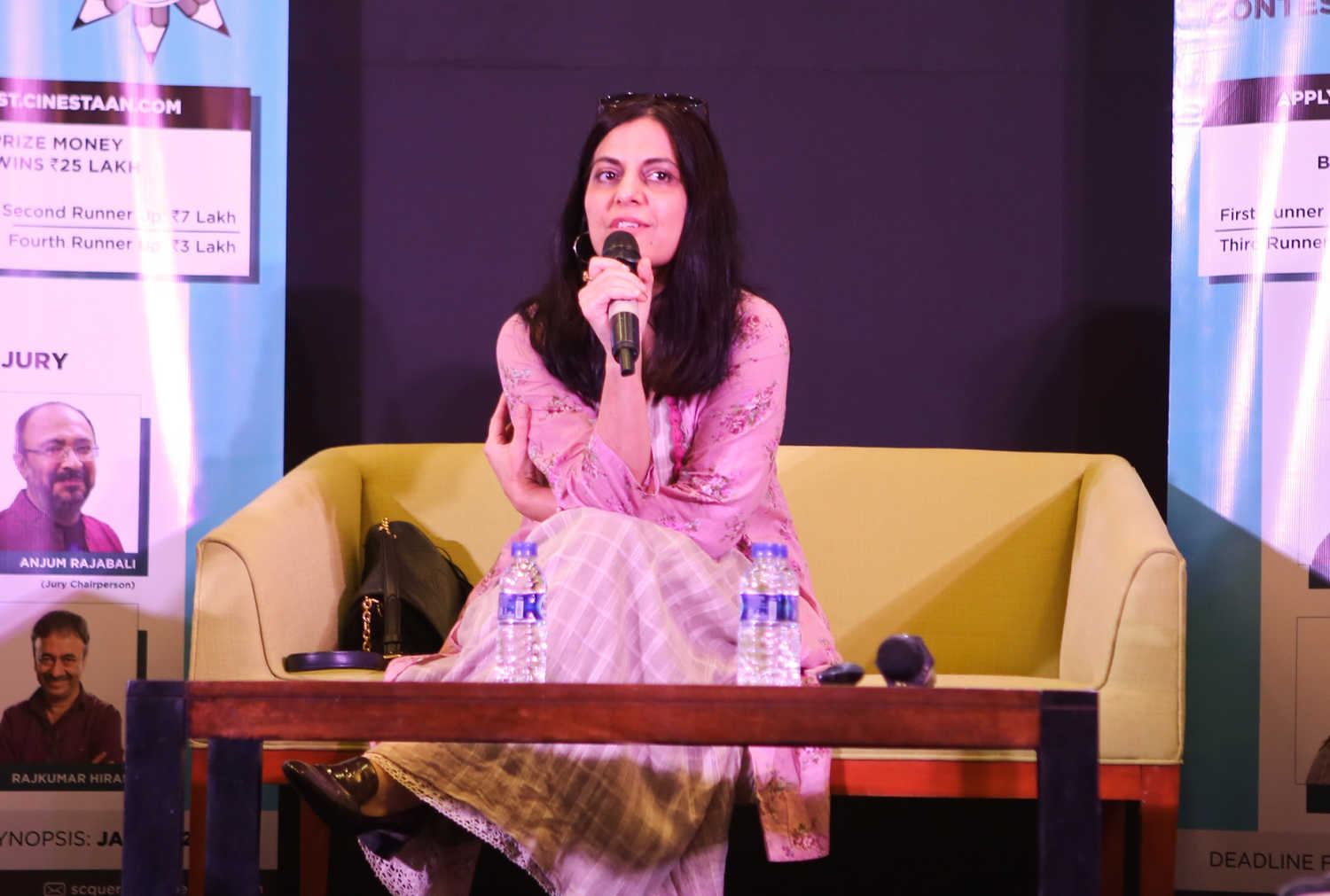The screenwriter and jury member on the Cinestaan India's Storytellers Contest revealed the methods behind her craft at an exclusive workshop held at The Club in Andheri, Mumbai.
Juhi Chaturvedi: Once you know what the idea is, everything else works around it
Mumbai - 25 Oct 2018 18:55 IST


Sonal Pandya
After launching the second edition of Cinestaan India's Storytellers Contest with her fellow jury members Rajkumar Hirani and Anjum Rajabali, screenwriter Juhi Chaturvedi addressed the shortlisted entrants to the first edition about how she goes about writing her screenplays.
The contest, which was announced in October last year and attracted close to 4,000 entries, is currently in the final stage of evaluation.
Entries for the second edition of the contest, run by Cinestaan Digital Private Limited, which also runs the website Cinestaan.com, are now being accepted online at https://scriptcontest.cinestaan.com. It carries a total prize money of Rs50 lakh.
The National Award-winning screenwriter of Vicky Donor (2012) began her 90-minute talk by wondering aloud about her films staying relevant 50 years down the line, like Hindi film songs usually are. Her film ideas are usually based on personal experiences or things she has seen.
She believes that your ideas are trying to bring out some very pertinent thoughts from inside.
“An idea can seize you from the inside,” she stated, saying it was okay to let it consume you. “It will not leave you. Idea is a stalker. It doesn't spare you. It takes away your sleep, routine and your sanity, everything.”
She also mentioned that she usually invests everything of herself in her work. But she advised the attendees that you don't need to say everything in your writing, allow the visual medium to take on some of the task as well. But the scene descriptions of these should detail everything including the silences.

Chaturvedi wrote her last film, October (2018), from the point of view of Dan, played by Varun Dhawan.
She revealed that she's old-fashioned in her writing methods, as she doesn't use a screenwriting software for her screenplays. She uses a Word document to write down her scenes.
Answering a question about her process at the workshop, Chaturvedi replied that you return to the environment you know best, referring to the milieu of the film.
She herself has been born and brought up in Lucknow, but for Vicky Donor, she couldn't see herself setting it there. “I didn't see it there, even though I know everything about it, the language, the food, the lanes,” she explained.

Then she thought about Mumbai, a city in which she has resided for nearly 20 years. “There was a little calculation going on in my mind, that if I set in Mumbai, then it might become easier. But I didn't know Mumbai that well. Perhaps that's because I haven't gone to school here. I had lived in Mumbai as a working person. My relationship with the city is very professional,” she said.
Instead, she set Vicky Donor (2012) in Delhi, where she stayed in a rented accommodation with friends in Lajpat Nagar.
“It became that it can be set in Delhi. This kind of guy can do this for money,” she said. “There can be this kind of Punjabi boy from Delhi. So the first process was to find out where it is going to be set. And once you know that, the nuances of that city and its people, the food and their way of life, then automatically your courage grows, that you can write more. You can write about these people.”
She then recalled her travels between Delhi and Lucknow, she was able to write more of the environment and characters’ backgrounds that could be used in her story of Vicky Donor. For example, Vicky and his mother Dolly, their family are actually refugees who have arrived in Delhi after the Partition.
“All these things helped me write this film,” Chaturvedi told the audience. “It just helped me take the script from one level to another. The process is very simple. Once you know what the idea is, where it is going to be, everything else works around it.”

Chaturvedi’s other films Piku (2015) and October (2018) are also set in Delhi. She also revealed that she can’t begin working on a new script immediately after finishing on script, she becomes empty.
“A film can leave you drained out, [leave you] emotionally so exhausted after that. When you pour yourself out, you feel empty. Then it takes few months to get back to something else,” the writer stated.
Later, her fellow jury member Anjum Rajabali commented that she has an allergy to anything that is constructed in a story.
“I find it’s a hearteningly extreme example of experiential writing. Unless she experiences every moment, every pause, every damn comma and exclamation mark that is coming in her scenes, she doesn’t write it,” he noted.
“I’m not surprised that by the end of it she’s drained,” Rajabali said. “Not only does she not want any other way, I suspect that she doesn’t know of any other way. The reason why she’s a screenwriter is this. In that sense, she’s unprofessional,” he joked on her refusal to begin another script straight away.




